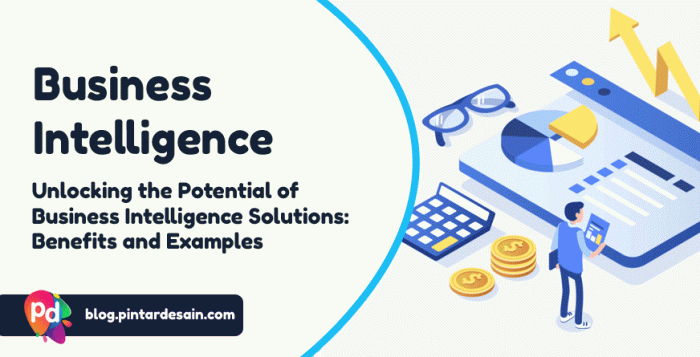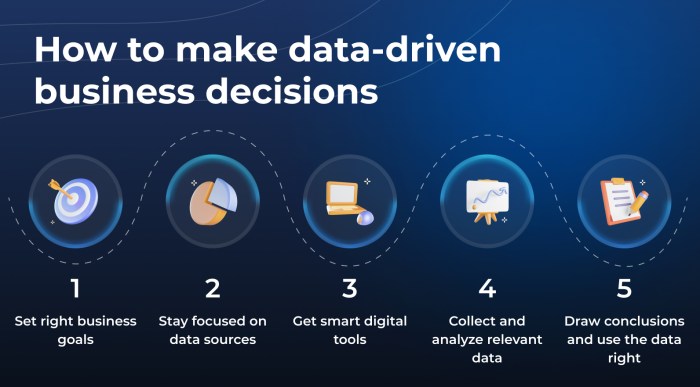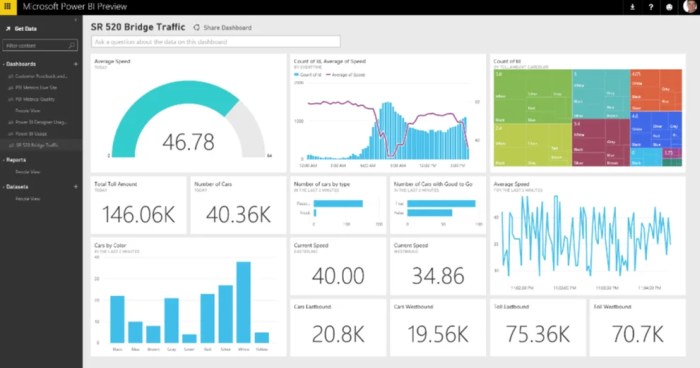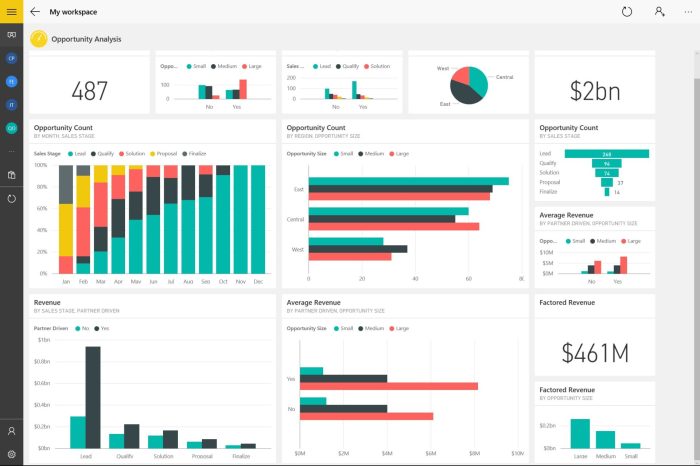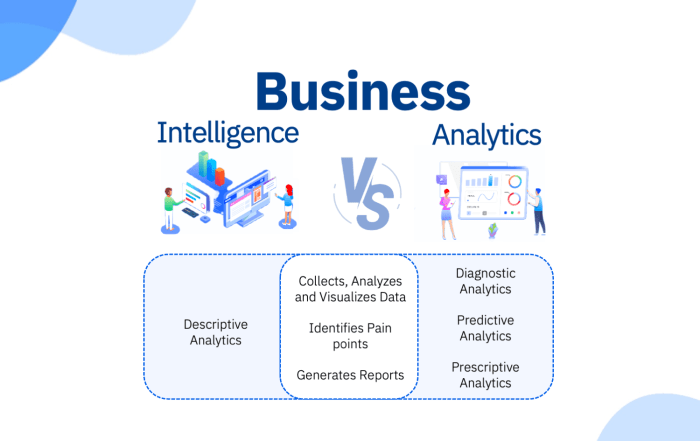Business Intelligence solutions play a crucial role in modern business operations, offering valuable insights and enhancing decision-making processes. From defining the concept to discussing its impact, this comprehensive guide covers everything you need to know about Business Intelligence solutions.
Introduction to Business Intelligence Solutions

Business Intelligence Solutions refer to technologies, applications, and practices for the collection, integration, analysis, and presentation of business information. These solutions help organizations make data-driven decisions by providing valuable insights into their operations, customers, and market trends.
Implementing Business Intelligence Solutions is crucial in modern business operations to gain a competitive edge, improve efficiency, and drive growth. By harnessing data and analytics, companies can optimize their processes, identify new opportunities, and mitigate risks effectively.
Examples of Industries Benefiting from Business Intelligence Solutions
- Retail: Retailers use BI solutions to analyze customer behavior, optimize inventory management, and personalize marketing strategies.
- Finance: Financial institutions leverage BI tools to monitor market trends, assess risks, and enhance compliance with regulations.
- Healthcare: Healthcare providers utilize BI solutions to improve patient care, streamline operations, and manage costs efficiently.
- Manufacturing: Manufacturers employ BI technologies to track production performance, forecast demand, and optimize supply chain operations.
Components of Business Intelligence Solutions
Business Intelligence Solutions consist of various key components that work together to help organizations make data-driven decisions and gain insights. These components include data integration, data warehousing, data visualization, reporting, and analytics tools.
Data Integration
Data integration plays a crucial role in Business Intelligence Solutions by combining data from different sources into a unified view. It involves extracting, transforming, and loading data from various systems and databases to create a centralized data repository. This process ensures that the data used for analysis is accurate, consistent, and up-to-date.
Data Visualization
Data visualization is another essential component of Business Intelligence Solutions that helps users understand complex data through visual representations such as charts, graphs, and dashboards. By presenting data in a visual format, users can easily identify patterns, trends, and insights that may not be apparent in raw data. Data visualization enhances decision-making by enabling stakeholders to interpret information quickly and effectively.
Reporting and Analytics Tools
Reporting and analytics tools are integral components of Business Intelligence Solutions that enable users to generate reports, conduct ad-hoc queries, and perform in-depth analysis on data. These tools provide users with the ability to extract valuable insights, track key performance indicators, and monitor business metrics to support strategic decision-making.
Overall, the combination of data integration, data visualization, reporting, and analytics tools forms a comprehensive Business Intelligence Solution that empowers organizations to leverage their data effectively and drive business success.
Implementing Business Intelligence Solutions
Implementing Business Intelligence Solutions within an organization involves several key steps to ensure successful integration and utilization of data-driven insights. From selecting the right software to addressing common challenges, a strategic approach is necessary for effective implementation.
Steps Involved in Implementing Business Intelligence Solutions
- Assessing Business Needs: Identify the specific goals and objectives that the organization aims to achieve through business intelligence solutions.
- Choosing the Right Software: Evaluate different BI software options available in the market based on features, scalability, and compatibility with existing systems.
- Data Integration: Ensure seamless integration of data from various sources to create a unified database for analysis and reporting.
- User Training: Provide comprehensive training to employees on how to use the BI tools effectively to derive actionable insights.
- Monitoring and Evaluation: Continuously monitor the performance of BI solutions and make necessary adjustments to optimize outcomes.
Comparing Different Software Options for Implementing Business Intelligence Solutions
- Tableau: Known for its user-friendly interface and powerful visualization capabilities, Tableau is a popular choice among organizations seeking to create interactive dashboards.
- Power BI: Developed by Microsoft, Power BI offers seamless integration with Excel and other Microsoft products, making it a preferred option for businesses already using Microsoft tools.
- QlikView: With its associative data model, QlikView allows users to explore data relationships intuitively, enabling a deeper understanding of business insights.
- MicroStrategy: Trusted for its enterprise-grade analytics and scalability, MicroStrategy is often chosen by larger organizations with complex data needs.
Common Challenges Faced During the Implementation of Business Intelligence Solutions
- Data Quality Issues: Inaccurate or incomplete data can hinder the effectiveness of BI solutions, emphasizing the importance of data cleansing and validation processes.
- Lack of User Adoption: Resistance to change and inadequate training can lead to low user engagement with BI tools, emphasizing the need for proper onboarding and support.
- Integration Challenges: Compatibility issues with existing systems and data silos can pose obstacles to seamless integration, requiring a robust IT infrastructure and data governance framework.
- Scalability Concerns: As data volumes grow, scalability becomes a critical factor in ensuring that BI solutions can handle increasing data loads and user demands effectively.
Benefits of Business Intelligence Solutions

Business Intelligence Solutions offer a wide range of advantages that can significantly impact decision-making processes, operational efficiency, and overall business growth and competitiveness.
Improved Decision-Making
- Business Intelligence Solutions provide real-time insights and data analysis, enabling decision-makers to make informed decisions quickly.
- By centralizing data from various sources, businesses can gain a comprehensive view of their operations, customers, and market trends, leading to better strategic decisions.
- Access to interactive dashboards and reports allows for better visualization of data, facilitating easier interpretation and decision-making.
Enhanced Operational Efficiency
- Automation of repetitive tasks and processes through Business Intelligence Solutions can streamline operations and reduce manual errors.
- Identifying inefficiencies and bottlenecks in processes becomes easier with data-driven insights, leading to optimized workflows and resource allocation.
- Predictive analytics capabilities help businesses anticipate demand, trends, and potential issues, allowing for proactive decision-making and problem-solving.
Business Growth and Competitiveness
- By leveraging Business Intelligence Solutions, businesses can identify new opportunities for growth, such as untapped markets or product innovations.
- Competitive analysis through data comparison with industry benchmarks and competitors helps businesses stay ahead of the curve and adapt quickly to market changes.
- Improved customer satisfaction and retention through personalized marketing strategies based on data insights can drive business growth and enhance competitiveness.
Trends in Business Intelligence Solutions

As technology continues to evolve, the field of Business Intelligence Solutions is also experiencing significant trends that are shaping the industry. Let’s explore some of the emerging trends that are influencing the future of Business Intelligence Solutions.
Role of Artificial Intelligence and Machine Learning
Artificial Intelligence (AI) and Machine Learning (ML) play a crucial role in the advancement of Business Intelligence Solutions. These technologies enable organizations to analyze large volumes of data more efficiently and accurately, providing valuable insights and predictive analytics. AI and ML algorithms can identify patterns, trends, and anomalies in data, helping businesses make informed decisions and improve performance.
Cloud-Based Business Intelligence Solutions
Cloud-based Business Intelligence Solutions are revolutionizing the industry landscape by offering scalable, flexible, and cost-effective alternatives to traditional on-premises systems. With cloud-based BI solutions, organizations can access real-time data from anywhere, collaborate seamlessly, and leverage advanced analytics tools without the need for extensive infrastructure investments. This shift towards cloud-based solutions is driving innovation and agility in the Business Intelligence space.
In conclusion, Business Intelligence solutions are essential tools for driving growth, improving efficiency, and staying competitive in today’s fast-paced business landscape. By harnessing the power of data and analytics, organizations can make informed decisions and achieve long-term success.
When it comes to luxury sedans, the Acura RLX stands out with its exceptional performance and elegance. With a sleek design and powerful engine, the RLX redefines what a sedan can be, combining luxury with driving excitement.
The Toyota Avalon Limited is the epitome of luxury and performance in the sedan category. With its refined interior, advanced technology, and smooth ride, the Avalon Limited offers a truly luxurious driving experience.
For those seeking luxury with power and efficiency, the Volvo S90 Recharge is the perfect choice. This sedan combines elegant design with a plug-in hybrid powertrain, offering both performance and environmental sustainability.
